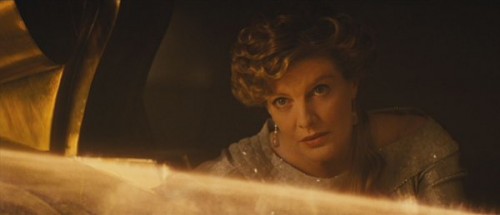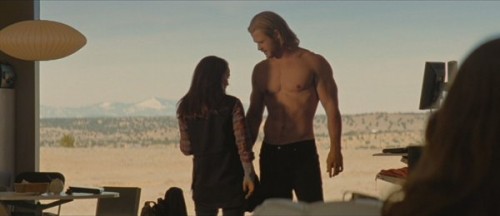Here we are once more, and on time, too, with the second installment of The (Bad) Medieval Movie Club and Part II of my review of Thor, conducted in association with the Bettina Bildhauer. ((Bettina Bildhauer appears courtesy of the Bettina Bildhauer Fund, LLC, and she, the fund, and its affiliates and associated stockholders disavow anything contained herein deemed offensive by any party, whether said party may be found on this Middle Yard (Miðgarðr), or on any of the other of the nine affiliated homesteads (Níu Heimar) which comprise the Norse cosmology, or in any other plane of existence found to comprise parts located either within the roots of the world tree (Mjötviðr), parallel to it and/or to its material existence, or beyond the the vale of tears through which both mortal and immortal alike may catch but fleeting glimpses. Mirror universes, particularly those where mustaches designate deviation from prime reality are exempted from all claim, except where otherwise obligated by treaty negotiated explicitly or implicitly by team of displaced heroes from prime reality during a two-part episode in which aforesaid displacees gain self knowledge of something hidden even from themselves but revealed through encounter with one or more of their mustached doubles in which a separate peace is reached. (see Nidhöggr v. Veðrfölnir, c. 1000; Spock Xtmprsqzntwlfd v. Spock Xtmprsqzntwlfd (Goatee), 2267 (stardate unknown); Phineas Doe v. Gene Forrester, 1959.) )) Be sure you’ve read the exciting part one, or this will all likely make little sense. But then that’s how this thing is going to play out no matter what you’ve read first.
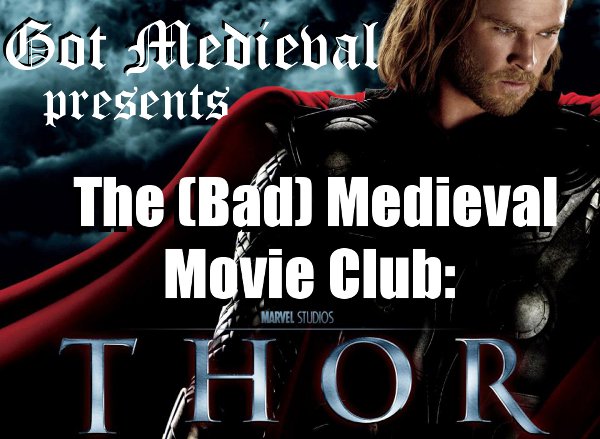
Carl: When last we left our heroes, Thor was falling out of a space tornado into a Mystery Machine knockoff driven by a team of scientists who, apparently, study the natural laws of the universe that dictate the precise moment when Spacedads will hurl their rebellious sons to Earth via space tornado. Getting thrown into the path of a speeding car by your angry dad shouldn’t count as a “meet cute,” but the movie begs to differ, springboarding into light romantic comedy which serves to buoy us through a passel of subplots that almost come together for the CGI finale.
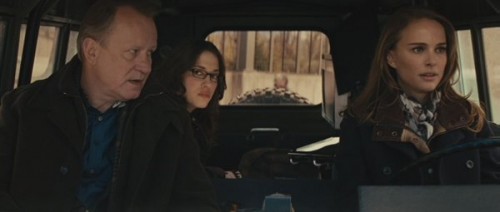
Meet the B-Team: Stellan Skarsgård as Prof. Erik Selvig; Kat Dennings as Darcy, the taze-happy intern; and Natalie Portman as a scientist who looks and acts exactly like Natalie Portman
Bettina: Let’s get those subplots over and done with quickly. Loki’s adopted; Loki’s a traitor; Odin falls asleep; Loki takes over and smears Thor’s name; Sif and the Warriors Three try to clear him. SHIELD builds a tent city around Thor’s lost hammer. Thor must learn a lesson to get his hammer. Cue a fight with the Destroyer, a huge black coat of armour sent by Loki that shoots many lasers: at Thor, then at some New Mexican townsfolk, then the newly arrived Asgardian heroes arrive to help, then Thor again when he learns his lesson. Thor reclaims his hammer and godhead, defeats the armor, and takes the fight to Asgard.
Carl: An able summary, but you left out the lesson that scores Thor the hammer.
Bettina: You did read the first half of the review, yes?
Carl: I know. Daddy knows best. But Daddy sure has a confusing way of teaching what he best knows. When he locks away Thor’s power, Odin seals it with the prophecy-key “Whoso holds this hammer, if he be worthy, shall possess the power of Thor”, which made me expect the movie would subsequently show Thor doing something sufficiently worthy to trigger the conditional, and then he’d go grab the hammer and lift it aloft ala King Arthur as his power returned. Instead, Thor gets beat up, and then the hammer flies right to his hand. The beating made him worthy, I guess? Odin should have inscribed the hammer with “Fly into the hands of the first person bruised heavily worthy and grant them the power of Thor.”
Bettina: Way too much thinking. The hammer is not really a hammer, nor the inscription a binding contract. Both are manifestations of daddy’s power. Odin took Thor’s power away, and he can give it back when he pleases. If you watch carefully, you’ll see that Odin’s the one who pulls it out of the stone when his boy needs it, or at least he’s the one who lubricates it sufficiently so that it may fly free on its own–with the power of his corpse’s tears, which fall onto it from Asgard, no less.
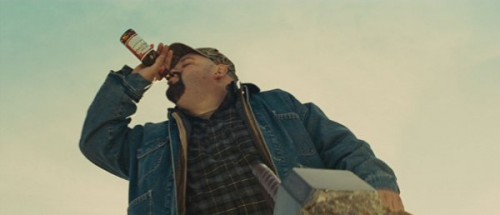
Did we mention the bonus extended redneck cut of The Sword in the Stone? (SPOILER ALERT: rednecks aren’t worthy.)
Carl: Sleep tears, not corpse tears. Odin’s not dead, just sleeping. Odinsleeping, actually, which is a special kind of sleep that only Odins do. ((When the plot requires that Loki be allowed to take over Asgard and no one can be bothered to come up with a fittingly sneaky way for the Prince of Lies to have managed it.)) That’s another comic book word that I don’t know that they ever explicitly say in the movie, like the name of the Destroyer, which I went back and edited into your comments above while you were preoccupied with Thor’s abs.
Bettina: “Sleep tears” then. But, remember, even death is not irreversible in the crazy world of medieval film.
Carl: Nor the crazy world of comic books. While it might look like you’re dead, it’ll later turn out that your mentor’s personal physician only faked the death, autopsy, and burial to teach him a lesson about not endangering young proteges. And even if you do somehow manage to die, Superboy might punch the universe really hard and the vibrations will make you pop back alive in your coffin.
Bettina: Or it’ll turn out that you only look dead because you’ve got a magic root in your mouth which means you can’t even feel the liquid gold they’re pouring into your hand to check whether you’re really dead (though the hot metal leaves a tell-tale hole through which the sun will shine later as you are playing chess for someone’s head). Carl, there is nothing new in the world. My story is from Salman and Morolf, c. 850 years old, yours?
Carl: The recent fates of Robins IV and II, respectively, of “Batman and …” fame, circa the last five years.
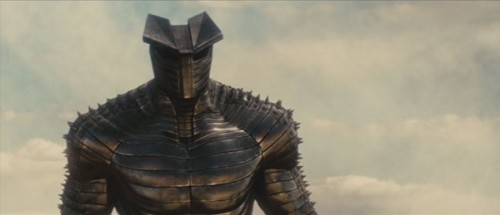
Since there's never a good shot of the two together, cut out this picture and paste a Thor of your own in the whitespace
Bettina: And speaking of the movie we actually watched: did you notice a lot of this is actually a Battle of the Things? The hammer returns to Thor during the fight with the Destroyer, its exact counterpart, another lifeless object that seems to act of its own accord, but is actually remote-controlled from Asgard. The all-decisive battle between the hammer and the armour is in fact a battle between Thor and Loki, aka Good and Evil, conducted through object proxy.
Carl: But since both Thor’s hammer and the Destroyer are manifestations of the conveniently napping absent Space Dad, ((The Spacedadnap was upon him, I mean. Asgardians, they have a word for everything, because they’re allowed to ram two words together and pretend it’s a new word. Like the Germans.)) it’s really just Odin playing with himself.
Bettina: Or in a slightly more elevated register, it’s the delicate balance of divine preordination and human free will that so concerned medieval theologians, too. If God knows everything that will happen, how can I still make a decision to do good or evil? (We Germans might call this an issue of Willensfreiheit vs. Vorherbestimmung.) ((More smushedtogetherwords.))
Carl: Easy. You may decide whatever you like, so long as you’d like to do exactly what Space Dad wants you to do, or no hammer for you, you ungrateful little monster.
Bettina: And if I don’t want a hammer?
Carl: If you don’t want a hammer, then Odin has no use for you, or so he explains in his new book Rich Dad, Poor Dad, Jerkface Hammer-Obsessed Dad.
OK, he’s not that bad, really, and it is nice to see Anthony Hopkins get to redeem himself, if only a bit, after the ill-conceived monster-father role that Neil Gaiman wrote him for Beowulf. What is it with scifi/fantasy writers and dads? Alias? Evil dad. Lost? At least three evil dads. Star Trek lens flare edition? One cold distant dad and one sainted dead dad.
Bettina: Even though your examples betray your own Oedipal complex directed at J.J. Abrams, your point is taken (from something I said earlier, no less): no Hollywood writer has had a healthy relationship with their dad! Neil Gaiman knew what he was doing (he knows most things).
Carl: Still, that’s two dad roles in three years for Anthony Hopkins. One more and he will become Hollywood’s new contractually obligated Everydad. Does that make Rene Russo Everymom-by-proxy?
Bettina: How can she be Everymom? She’s really only a wife (not even an Everywife) and has no meaningful relationship with her sons beyond supporting whatever her husband decides (like good candidates’ spouses during election season). There’s nothing motherly about her.
Carl: Not to force you out of your cozy parenthesis, but Medieval Jane Jetson ((Not to be confused with Space Wilma Flintstone.)) is nothing like that. Political trophywifebots are blond and wear high-collared red skirt suits with flag pins on the lapels and pearl studs while standing, eyes vacant, behind and to the right of their men. Rene Russo, on the other hand, is only dyed dirty-blond as Frigga, and she wears a high-collared chain mail skirt suit and dangly pearl earrings. Yes, she stands to her husband’s right for most of the film, but she stands slightly further away, because Asgardian rooms are enormous, and while standing she looks concerned, not vacant. Concern is motherly, right?
Bettina: True that (as Idris Elba might say, were he on The Wire and not wasted playing Heimdall in this movie). Hollywood Frigga mothers her husband, typical feminist that she is. But I suspect she may be standing because there’s very little furniture in those enormous rooms.
Carl: Blame Better Asgardian Homes and Gardens: every month for the last thousand years it’s all glossy spreads of cavernous rooms furnished only with a single bench or table. Spacemom would love to branch out into sitting while looking concerned, if not for the one room, one furnishing rule. And as difficult as it must be to sit down in the space armor everybody’s always wearing, Asgardians probably just loom near the furniture anyway. ((CGI furniture is so expensive we can’t let actors block our view by using it.))
Bettina: It’s called conspicuous consumption. Furniture to be admired, not used.
Carl: I’d rather believe that Asgard was carefully imagined by the screenwriter as a prop-based society. Not just the hammer and the armor, but everything. Whoso leaneth against the wall beside this uncomfortable bench, be he worthy, shall have the power of Thor’s uncle Rob. ((In the original Middle High German: Thrøb.)) Whoso standeth near this potted plant, if he be worthy, shall have to water it next. Whoso inscribeth “Whoso, etc.” onto this hammer, if he be worthy, shall be paid his wages in handsome but impractical stone benches. Sif and Thor probably started dating because they happened to be standing near each other next to an end table in a gigantic room for too long and thereby became commonlaw betrothed. It would explain their lack of chemistry.
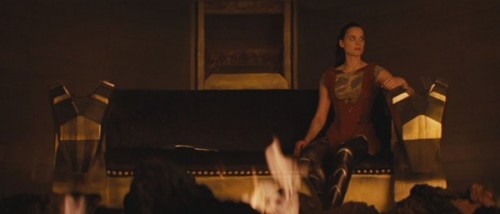
Sif, kicking back and relaxing by the open fire pit in thigh-high metal boots and chain mail camisole. Like you do.
Bettina: Except Sif and Thor are not really dating in this film, she just gets to cast longing glances at him. Tough amazon she may be, all she wants is a man. Much like Natalie Portman, who may have a PhD, but what she really wants is a guy to read her fairytales and to act like a prince straight out of one–which is why she warms to our man Thor.
Carl: Warms? Lukewarms, maybe, and that’s being generous. Do they ever even kiss? The more movies I see Natalie Portman in, the more it amazes me she’s considered a bankable romantic lead. She seems to have trouble evincing any emotion ever had by a normal human. When she smiles, it’s like she’s very carefully copying a smile she saw once in a magazine. She’s great when you need a psychotic black swan or a broken china doll turned assassin, but not so good for the puppy love.
Bettina: Maybe she doesn’t want to show up the Aussie hunk with her method acting.
Carl: He studied acting at Gold’s Gym. But what does she see in him, other than abs and pecs and glutes other muscles I don’t know the contracted names of?
Bettina: Not only is Thor straight out of the Norse myths, as her father figure, Dr. Skarsgård, shows her in a conveniently handy children’s book (where all good myths eventually end up) but he also woos her with fairy/mythic/proto-science stories about the world ash tree. (“Your ancestors called it magic, and you call it science. But I come from a place where they are both the same.”) He’s from fairyland, aka The Middle Ages, all right. She probably went into research only to please her absent father and her unemotional academic substitute father, but you can tell her heart’s not in it. She’d happily let the research go just to experience the rainbow bridge with her beau. ((If only text could conjure a proper Butthead accent, I’d say “Hey, baby, wanna go experience my rainbow bridge? Uh huh huh. Huh huh. Huh.” But the limitations of the medium keep me from making such a crass joke.))
Carl: It makes you wonder why they made her character a scientist, if they were going to let her be so easily lured away from it. Or it would make you wonder if you’d never seen another comic book movie. These days, the comic book love interest can’t make the leap to the screen without picking up a lab coat along the way.
Bettina: Speaking of comic books: presumably, they hold the explanation for this SHIELD organization? I know it all makes sense to Marvel fans like yourself, but never having been a pre-teen boy (of any gender), I don’t get it. There are vague mumblings of it having to do with ‘the government’, but to me it’s just another sign that power is so much better when it’s not represented by faceless men in suits, but by kings and Gods.
Carl: Oh, ye of slight comic book knowledge, let me explain SHIELD to you. It’s an acronym. It stands for [Interminable series of bad SHIELD acronym jokes redacted by order of SHIELD].
Bettina: Those certainly were the cleverest acronym jokes I have ever read. But, if we might move past this brilliant line of thought, what is it they do exactly?
Carl: Take the CIA, FBI, and NSA, give them matching blue and white uniforms and make half of them robotic clones of Nick Fury. When they were introduced they were spies in the Get Smart vein, but then somebody at Marvel watched an episode of The X-Files and they became a secret conspiracy agency that operates behind the scenes being secret and hatching conspiracies. And in the Marvel movieverse it looks like all the major heroes’ dads had a hand in forming it.
Bettina: Aha, that illuminates it. I thought I’d recognised that Agent Smith guy from one of the other films. One last thing about fathers (since you’ve brought them up again): at the risk of sounding c. 100 years out of date, I think this film does a nice job of suppressing the Oedipal drama: the bit about sleeping with the mother, or indeed anyone, is totally suppressed for prudish twenty-first century audiences, and the bit about wanting to kill the father is devolved to an evil brother, so that Thor can make his father proud by subjecting himself totally to his authority. Kenneth Branagh was probably thinking Shakespeare and not Freud, though they both say the same things.
Carl: Thor is Freud subverted. Spacemom is desexualized with high collars. No messy desire there. Instead of killing his father, Thor resurrects him… or wakes him from his nap sometime between scenes. They don’t really go into how, but he’s there all happy and awake at the end. There’s a lot of loose ends in this thing nobody bothers tying together.
Bettina: Right, but I like this film, for all its ultra-conservative, patriarchal values. It is so over the top that it actually exposes how silly this power structure is. If all power ultimately comes from Anthony Hopkins and a personalised hammer, then it can’t be that hard to change the system, can it? Plus, this view of men is actually not a bad representation of what most medieval masculinity was all about: being able to take an insult or injury, by being either totally not bothered, or able to strike back in style.
Carl: Well, it’s only as hard to change the system as it is to find a new king. And I seem to remember that posing a little problem during the Middle Ages. From time to time.
Bettina: See! But mostly, this is a film fan’s film, it celebrates cinema. When the characters go on about how magic is just another kind of science, and primitive (Viking) civilisations might have understood the advanced space-travel technology of the Asgardians as god-like because they couldn’t explain it in any other way, what they are also talking about is the magic of cinema. Maybe I don’t get out much, but I thought the first bird’s eye views of Asgard in 3D were stunning – a whole imaginary world in front of your own eyes, working towards the promise that motion pictures keep making of creating that world in more and more realistic ways, first through moving images, then sound, then colour, then CGI, now 3D.

The Asgardians live in the Paramount logo. Did we mention that? Seems like maybe we should have before now.
Cinema is the advanced technology that is at the same time myth and magic again. While older medieval films keep claiming that they are better than books (like medieval manuscripts and art were better than boring old print), this film says it’s better than Facebook, better than iPods, better than computers, better than comics. When Dr. Hottie’s hapless assistant Darcy takes a picture of Thor misbehaving in a diner in order to post it on Facebook, this shows not how cool Facebook is, but how secondary it is to the world of film, where the most amazing, newsworthy things really happen.
Carl: I’d argue the Facebook line is more tacked on because Hollywood execs know they have to include the emerging media. Y’know, for kids. And while there’s a glut of technology in this movie, none of it actually helps anyone, and most of the time it doesn’t make any sense. When Thor is captured by SHIELD, they look him up in a computer database and somehow it pulls up a copy of a forged driver’s license with his smiling picture on it, the picture Darcy took and posted to Facebook. Did she crosspost to the DMV?
Bettina: Well, it all makes sense on a deeper level: that Thor uses Black Swan’s ex-boyfriend’s ID goes to show what kind of role he’s beginning to play. And it also shows, as medieval films must always, that written documents are easily forged. But then, also typical of medieval film, the message is flipped once again when the stormchaser’s computers and backups are stolen by SHIELD, and the heroes must use their good old hand-written notebook to recreate everything. After the future, comes the past.
Carl: Good line. And if anyone asks, I shall tell them that that’s why we abandoned our earlier commitment to sticking to the film’s chronology and recapping in favor of asynchronous diachronic explication.
Bettina: You will tell them that your computer and backups were stolen by SHIELD and you had to use your good-old hand-written notebook to recreate this review?
Carl: Yes. SHIELD is always messing things up for me. [Jokes at the expense of SHIELD redacted by order of SHIELD] (([This footnote likewise redacted by order of SHIELD])) Don’t worry, when I recreate your half of the dialogue from my handwritten notes I’ll make you sound an extra 20% hip.
Bettina: Can you work into my half some cool slang like Idris Elba might use on The Wire?
Carl: Consider it done. But to wrap up the plot, sometime after all those subplots, Thor and company storm the gates of Asgard and beat Loki down, but in the process the Rainbow Bridge that connects Earth and Asgard through a superhighway of CGI tornadoes is severed, leaving Thor on one side of the multiverse and his Gal Friday on the other, each consoled only by the absolute certainty that a series of less successful sequels will reunite them. And then after the credits we find out Loki’s not dead, not that anyone ever had reason to think he was. He’s biding time until he gets to hang out with Robert Downey Jr. on the set of The Avengers.
Bettina: SPOILER ALERT! (Thought I’d get this in one last time). Well, that was very swiftly wrapped up just before it got to be too much even for me. Before you feel the need to double back and describe the van collision scene again, I think we’d best close. Thank you so much for having me, it’s been a blast. You are a very funny man, Carl, even if you’ve edited out your best jokes by now (readers, ask him about his black swan routine).
Carl: [Joking reference to author’s best material being redacted by order of SHIELD redacted by order of SHIELD] Yes, and thank you for coming by. I think we’ve launched this recurring feature nicely. And remember, readers, you’ve got one more shot to win an autographed copy of Bettina’s book. The best comment on either Thor post, as determined by Bettina and myself, wins the prize. The lines will remain open until the next edition of the (Bad) Medieval Movie Club is posted, on some future Friday that may also be in the past, if I understand Bettina’s book correctly. ((♣ Once more, the great Reynard has sold out this blog. Muahahahaha! Foolish ones have paid me to tell you, “Get savings for Thor and other superhero movies with this Buy.com coupon code.”)) So no time to lose! ((Or possibly an infinite amount of time to lose, cyclically speaking, but probably best not to count on that.))
